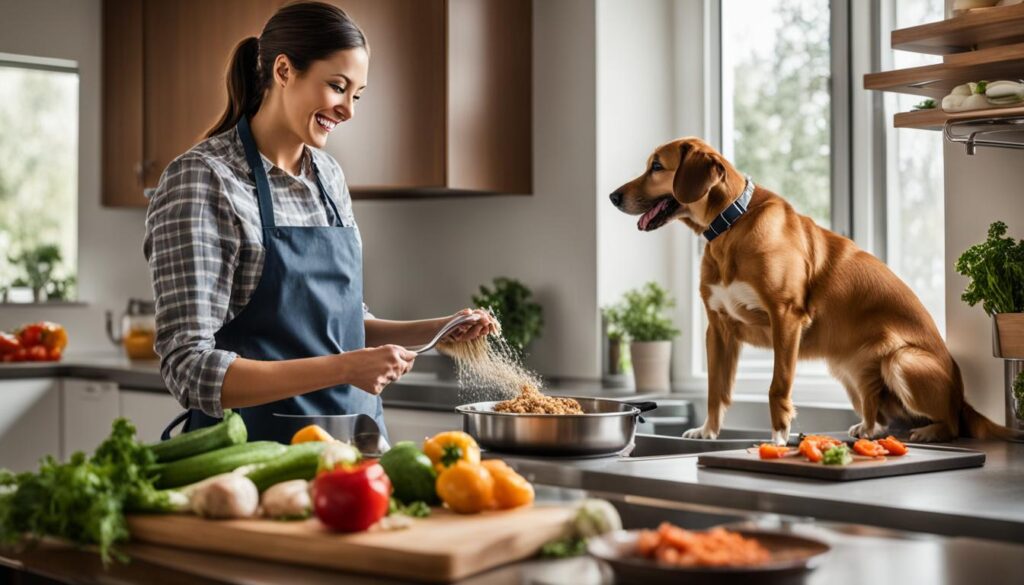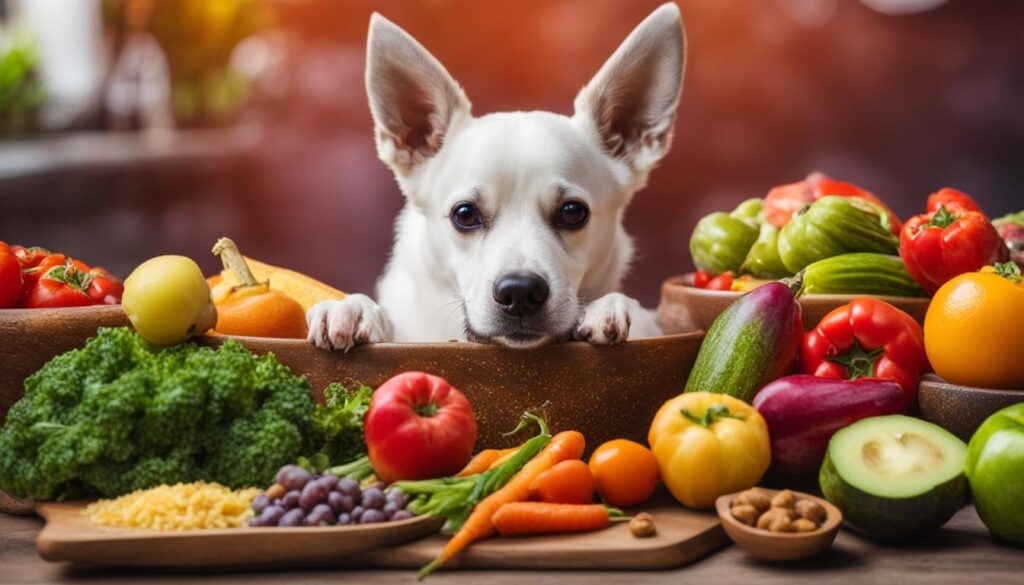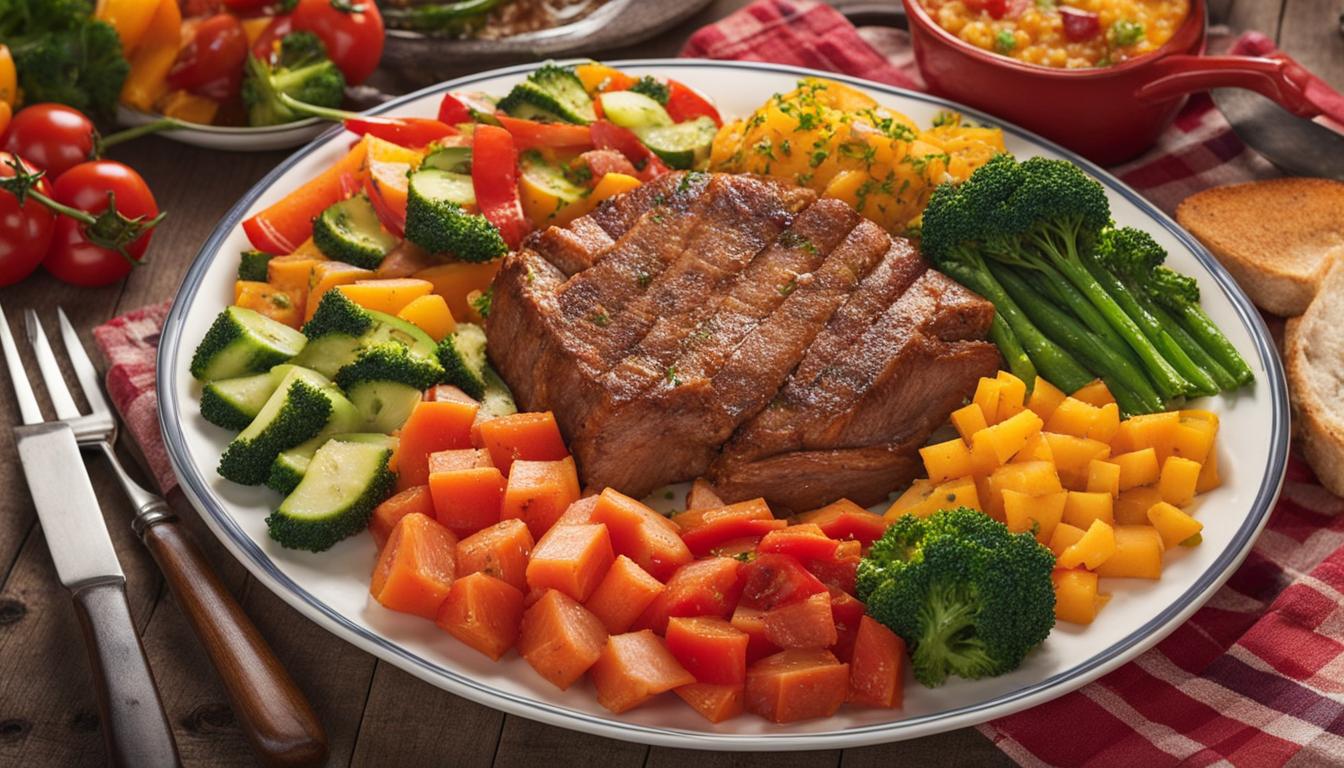Making the switch to a homemade cooked diet for your dog can provide numerous benefits, but it’s important to ensure that the diet is balanced and meets your dog’s nutritional needs. Consulting with a veterinarian or veterinary nutritionist is crucial to ensure that the diet is appropriate and tailored to your dog’s specific requirements. Many recipes available online may not be nutritionally balanced, so it’s essential to seek expert advice.
The American College of Veterinary Nutrition recommends considering factors like age, size, health, and breed when formulating a homemade diet for your dog. Additionally, certain groups of dogs, such as puppies and lactating dogs, have specific dietary requirements that may not be met by a recipe found on the internet. By understanding the basics of a balanced dog food diet and following expert guidance, you can provide your dog with a nutritious homemade cooked diet.
Key Takeaways:
- Consult with a veterinarian or veterinary nutritionist to ensure a balanced homemade cooked diet for your dog.
- Consider factors like age, size, health, and breed when formulating a homemade diet.
- Puppies and lactating dogs have specific dietary requirements that may not be met by online recipes.
- Understanding the basics of a balanced dog food diet is essential.
- Follow expert guidance to provide your dog with a nutritious homemade cooked diet.
Important Ingredients for a Balanced Homemade Cooked Dog Diet
Making the switch to a homemade cooked diet for your dog involves careful consideration of the key ingredients that contribute to a balanced and nutritious meal. By incorporating the right ingredients, you can ensure that your dog receives the essential nutrients needed for optimal health and well-being.
Premium Protein Sources
Protein is a fundamental component of a dog’s diet, providing the necessary amino acids for muscle development and repair. High-quality protein sources such as chicken, turkey, beef, lamb, and certain fish like salmon and sardines are excellent choices. These protein-rich options offer essential nutrients while being easily digestible for your furry friend.
Healthy Fats and Fatty Acids
Fats play a crucial role in providing energy, supporting cell function, and maintaining a healthy skin and coat for your dog. Opt for animal fats like chicken fat or beef tallow, as well as plant seed oils like flaxseed oil or coconut oil. These sources of healthy fats and fatty acids promote overall well-being and contribute to a shiny and lustrous coat.
| Protein Source | Healthy Fat Source | Carbohydrate Source | Fiber Source | Vitamin and Mineral Source |
|---|---|---|---|---|
| Chicken | Chicken Fat | Brown Rice | Carrots | Spinach |
| Turkey | Coconut Oil | Oatmeal | Pumpkin | Kale |
| Beef | Beef Tallow | Quinoa | Broccoli | Blueberries |
Nutrient-Rich Carbohydrates
Carbohydrates are an essential source of energy for dogs. Opt for carbohydrates like rice, pasta, oatmeal, and quinoa, which provide a healthy and easily digestible energy source. These carbohydrates should be cooked thoroughly before incorporating them into your dog’s diet.
Fiber-Rich Vegetables
Fiber plays a crucial role in maintaining proper digestion and weight management for dogs. Incorporate fiber-rich vegetables such as carrots, pumpkin, and dark leafy greens like spinach and kale into your homemade cooked dog meals. These vegetables promote a healthy digestive system and contribute to a feeling of fullness for your dog.
Vitamins and Minerals
Ensure your dog receives a sufficient supply of essential vitamins and minerals by incorporating fruits, vegetables, organ meat like liver, and plant oils into their diet. These sources provide a wide range of nutrients necessary for growth, maintenance, and overall well-being.
Remember, water is an often overlooked but essential ingredient in your dog’s diet. Provide clean, fresh water at all times to support their hydration and overall health.

Safe Cooking Practices for Dog Food
When preparing homemade cooked dog food, it’s crucial to follow safe cooking practices to ensure the health and well-being of your furry friend. Here are some important guidelines:
- Thoroughly cook all meats to eliminate any potential bacteria or parasites. Avoid feeding raw or undercooked meat to your dog.
- Clean and sanitize all kitchen utensils and surfaces used during food preparation to prevent cross-contamination.
- Store homemade dog food in airtight containers in the refrigerator to maintain freshness and prevent spoilage. Avoid leaving it at room temperature for too long.
- Wash your hands thoroughly before and after handling dog food to minimize the risk of foodborne illnesses.
Always prioritize the safety and well-being of your dog by practicing proper food handling and storage procedures. Consult with your veterinarian for further guidance on safe cooking practices specific to your dog’s dietary needs.
Resources for Creating a Homemade Cooked Dog Diet
If you’re considering transitioning your dog to a homemade cooked diet, it’s essential to have access to reliable resources and expert guidance. Here are some valuable resources to help you create a balanced and nutritious homemade diet for your furry friend:
1. Veterinary Consultation
Your dog’s veterinarian is your primary resource when it comes to homemade cooked dog diets. They have a comprehensive understanding of your dog’s health history and specific nutritional needs. A consultation with a veterinarian will not only help you determine if a homemade diet is suitable for your dog but also provide guidance on selecting a recipe and making necessary adjustments to meet your dog’s unique requirements.

2. Veterinary Nutritionists
If you require more specialized guidance, veterinary nutritionists are experts in formulating balanced homemade dog food recipes. They can offer consultations and personalized recommendations based on your dog’s specific needs. Some veterinary nutritionists provide remote consultations, making their services accessible even if they are not in your local area.
3. American College of Veterinary Nutritionists
The American College of Veterinary Nutritionists (ACVN) is a reputable organization that offers valuable resources for pet owners. Their website includes informative brochures and FAQs on topics related to nutritional needs and homemade diets for dogs. These resources can provide you with a better understanding of the key considerations and principles behind creating a balanced homemade diet.
4. Online Platforms and Tools
If you prefer a more hands-on approach, online platforms like BalanceIT and Ask the Nutritionist offer guidance and tools to help you create balanced homemade dog food recipes. These platforms provide recipe generators, ingredient analysis, and meal planners that can simplify the process of formulating a diet that meets your dog’s nutritional needs.
Remember, while these resources can be valuable starting points, it’s important to consult with a veterinarian or veterinary nutritionist for personalized advice and to monitor your dog’s health and well-being throughout the transition to a homemade cooked diet. Homemade dog food recipes should always be adjusted based on your dog’s unique requirements.
Pros and Cons of Homemade Dog Food
When it comes to feeding your furry friend, homemade cooked diets for dogs have both advantages and disadvantages that should be considered. Let’s take a closer look at the pros and cons of homemade dog food.
Pros of Homemade Cooked Diets
- Control over Ingredients: One of the primary advantages of homemade dog food is that you have complete control over the ingredients used. You can ensure that only fresh, high-quality ingredients are included in your dog’s meals.
- Customization for Dietary Sensitivities: Homemade diets can be tailored to suit dogs with specific dietary sensitivities or allergies. You can carefully select ingredients that avoid common allergens or irritants.
- Palatability: Some dogs may find homemade food more appealing and palatable compared to commercial options. This can be especially beneficial for dogs with picky appetites.
Cons of Homemade Dog Food
- Nutritional Balance: One of the main challenges with homemade diets is ensuring that they are nutritionally balanced. It can be difficult to meet all of a dog’s nutritional needs without expert guidance, which may lead to deficiencies if not done properly.
- Time and Effort: Homemade diets can be time-consuming to prepare, requiring planning, shopping for fresh ingredients, and cooking. The additional time and effort involved may not be feasible for everyone.
- Financial Investment: Creating a balanced homemade diet for your dog may require additional financial investment compared to commercial dog food. Quality ingredients can be more expensive, and certain supplements may be needed to ensure proper nutrition.
Ultimately, the decision to feed your dog a homemade diet should be made in consultation with a veterinarian, taking into consideration your dog’s specific needs and circumstances. They can provide expert guidance to ensure that the diet is appropriate, balanced, and meets all of your dog’s nutritional requirements.
Summary:
Homemade cooked diets for dogs offer advantages such as ingredient control, customization for dietary sensitivities, and increased palatability. However, they also come with challenges, including the need for nutritional balance, time and effort in preparation, and potential financial investment. Consulting with a veterinarian is essential to ensure that a homemade diet is suitable for your dog and provides all necessary nutrients.
Homemade Dog Food Recipes
Now that you have a better understanding of the benefits and considerations of homemade cooked dog food, you may be curious about some recipes to get started. While it’s important to consult with a veterinarian or veterinary nutritionist for personalized recommendations, there are basic homemade dog food recipes available that can serve as a starting point.
The MSPCA-Angell Animal Medical Center provides sample recipes for dogs of varying weights, including a 15-pound dog, a 30-pound dog, and a 60-pound dog. These recipes are designed to provide a balanced diet and include a combination of protein, carbohydrates, vegetables, and necessary supplements.
Founder’s Veterinary Clinic also offers a sample recipe for a 20-pound dog, which features cooked chicken, brown rice, vegetables, and supplements. These recipes can be helpful in understanding the general composition of a balanced homemade dog food meal.
Remember, these recipes are a guide, and it’s important to customize them to meet your dog’s unique nutritional needs. Always consult with a veterinarian to ensure that the recipe aligns with your dog’s specific requirements. Additionally, closely monitor your dog’s weight and overall health when feeding homemade dog food to make any necessary adjustments along the way.
FAQ
Why is it important to consult with a veterinarian or veterinary nutritionist before switching to a homemade cooked diet for my dog?
Consulting with a veterinarian or veterinary nutritionist is crucial to ensure that the diet is balanced and meets your dog’s nutritional needs. They can assess your dog’s specific requirements and guide you in formulating a diet tailored to their needs.
What are the key ingredients that should be included in a balanced homemade cooked dog diet?
A balanced homemade cooked dog diet should include protein sources like chicken, turkey, beef, lamb, and certain fish. It should also include fats and fatty acids, carbohydrates for energy, fiber for digestion, and vitamins and minerals for growth and maintenance.
How can I ensure that the homemade cooked diet I prepare for my dog is nutritionally balanced?
It’s important to follow a recipe that has been recommended by a veterinarian or veterinary nutritionist. Avoid making substitutions or omissions that could result in nutritional deficiencies. Regular follow-up with the veterinarian is also important to monitor your dog’s progress.
Where can I find resources and guidance for creating a homemade cooked dog diet?
Your primary resource should be your dog’s veterinarian, who can provide expert guidance based on your dog’s specific needs. The American College of Veterinary Nutritionists and online platforms like BalanceIT and Ask the Nutritionist also offer informative resources and tools to formulate balanced homemade dog food recipes.
What are the advantages and disadvantages of feeding a homemade cooked dog diet?
The advantages include having control over the quality of ingredients, tailoring the diet to dietary sensitivities or allergies, and potential tastiness for the dog. Disadvantages include the need for careful planning and preparation, the potential difficulty in meeting all nutritional needs without expert guidance, and the time-consuming nature and potential extra cost compared to commercial dog food.
Are there any sample homemade cooked dog food recipes available?
Yes, there are sample recipes available that can serve as a starting point. The MSPCA-Angell Animal Medical Center and Founder’s Veterinary Clinic offer sample recipes for dogs of varying weights. However, it’s important to consult with a veterinarian to ensure that the recipe meets your dog’s specific nutritional needs.





